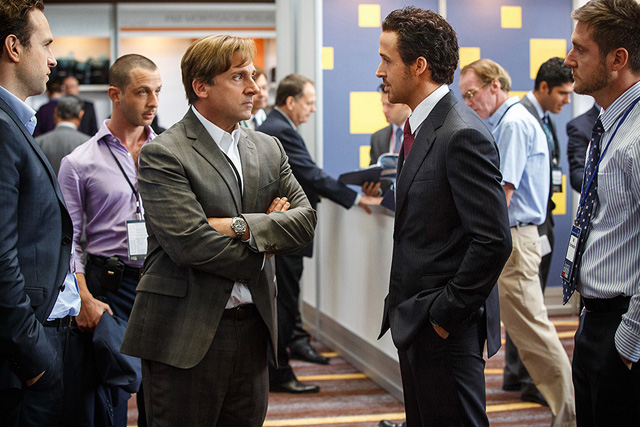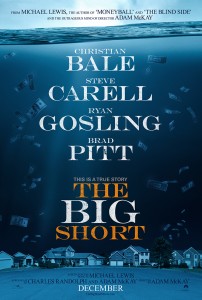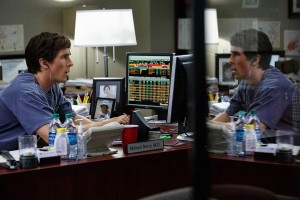Directed by Adam McKay | Written by McKay and Charles Randolph, adapting a book by Michael Lewis | 130 min | ▲▲▲▲△
After Jay Roach and Trumbo, McKay is the second example this month of a director of comedies—in McKay’s case, Will Ferrell diversions such as The Other Guys and Anchorman—taking a left turn into docudrama, though this effort’s a lot more compelling than Roach’s.
The Big Short is a look at a group of financial wizards and hedge fund managers who predicted the 2007 sub-prime housing market collapse and all decided to bet against the American economy. McKay stages it as a jagged, fourth-wall-breaking catalogue of malfeasance, each character who gets to speak to the audience quick to absolve themselves of responsibility for all that happened, or even of being a reliable narrator.
McKay’s outrage is palpable as he details the jaw-dropping corruption on Wall Street, how the fat cats’ greed took advantage of a deeply flawed system, leading to a global financial meltdown.
It’s a bit of a tough sell—the particulars of the American mortgage rules aren’t terribly clear, and even now I’m not sure I entirely understand it, despite a few handy explanatory vingnettes featuring Margot Robbie, Anthony Bourdain, and Selena Gomez. To make matters even more murky, our leads—including Steve Carrell, Brad Pitt, Ryan Gosling, Rafe Spall, Hamish Linklater, and an impressively understated Christian Bale—are essentially looking to get rich from the broken system, a high stakes gamble that will only work if millions of people lose their savings and their homes. The fact they’re smarter than everyone else allows them a special place in the tale, but at its core this is an apocalyptic story without heroes. Even the characters who have a conscience, it doesn’t stop them from doing exactly what all the other bankers and financial parasites were doing all along.
You might ask yourself what else they could they do—the press wasn’t interested in the story, there were no legal means to punish those who deserved it, and even the White House, instead of letting the banks fail, propped up the corruption with a massive bail-out. Which makes The Big Short an indictment of everyone, including those who profited from its (temporary) collapse.
It’s a fascinating, harrowing, and ultimately depressing story, and an important reminder of where America is twisted. Rome in its last days had nothing on this.








